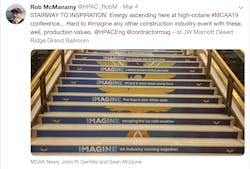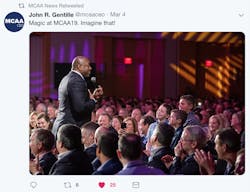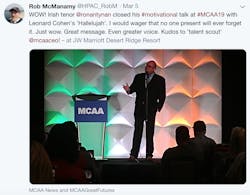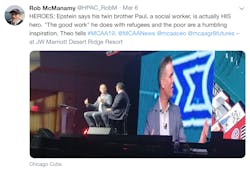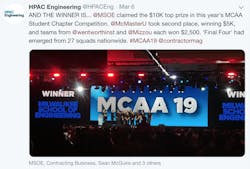MCAA Delivers Compelling Message of Community
"Wait, where am I again?”
Anyone who attended the Mechanical Contractors Association of America’s annual convention this March at the posh J.W. Marriott Desert Ridge Resort & Spa could certainly be forgiven if they momentarily forgot that they were at a trade show for the HVACR industry.
After all, the dazzling array of keynote speakers and entertainers included NBA Hall-of-Famer Magic Johnson, Chicago Cubs GM Theo Epstein, Irish Tenor Ronan Tynan, author Molly Bloom (from the movie Molly’s Game) and the band Imagine Dragons (pictured above). Every time one turned around at the 2,400-person event, it seemed like another celebrity and/or thought leader was dispensing inspirational advice, not just about being more successful at business, but also about, well, being a better human being.
“It’s all within our annual budget for this event, but we definitely want to give our members more... to make it more memorable and meaningful for them,” explained MCAA CEO John Gentille. Prior to joining MCAA, Gentille noted that he had spent 20 years at the Associated General Contractors of America (AGC), which has a membership 10 times the size of MCAA. “But our annual conventions at AGC were not like this,” he said with a smile.
Indeed, as someone who also has attended much larger shows—AHR Expo, Greenbuild, the AIA Convention, and even the massive World of Concrete—I can say that, pound for pound, MCAA’s four-day, mechani-palooza is easily our industry’s most star-studded and compelling event.
- For our interview with new MCAA President Brian Helm, click here.
Toward that end, the broad theme of this year’s conference was simply “Imagine”, which gave the speakers license to think big, even as it echoed the name of the musical headliner. And more often than not, attendees and accompanying spouses and even children were encouraged to think beyond themselves, to appreciate their family, friends, mentors, colleagues, rivals and employees.
A Greater Good
As the opening keynote, Johnson, the ex-basketball star turned team owner, emphasized resilience and the power of positive thinking. He said that his cheerful demeanor as a player, and even now as a business owner, has masked his constant drive to make himself better, as well as those around him, both in business and in life.
That competitive drive fueled tenor Tynan, too. The singer best known for his stirring performances of the National Anthem at Yankee Stadium during the 2001 World Series – just weeks after 9/11 – told his own compelling life story of hardship and redemption. Faith and family miraculously had buoyed him after a car accident in his early 20s had caused him to lose both legs below the knee. Nevertheless, he persevered to become a champion Paralympian, a medical doctor, and then later, almost by surprise, a world class tenor. In Phoenix, he ended his talk with a jaw-dropping rendition of Leonard Cohen’s Hallelujah.
Indeed, the ethos of service—and not just to customers—also fueled other presentations throughout the week. Chicago Cubs President Theo Epstein took a break from spring training games nearby to visit #MCAA19 and be interviewed onstage by outgoing MCAA President Michael Brandt. The youthful but legendary executive who incredibly had managed to help slay BOTH of Major League Baseball’s most famous championship curses— which had separately plagued both the Boston Red Sox and the Cubs for nearly a century—surprised many when he told the audience who his own hero is.
“It’s my twin brother, Paul, a social worker who still lives in Boston,” said Epstein. In fact, Paul is so well-known among the homeless and those seeking asylum in the U.S. that “refugees will show up at Logan Airport with a piece of paper that just has my brother’s phone number on it.”
Together, the pair in 2005 started the Foundation to Be Named Later, a charitable nonprofit “dedicated to improving lives through education, leadership and the healthy development of youth and families.” At the conclusion of their interview, Brandt announced that, in appreciation, MCAA would donate $25,000 to the Foundation.
Not Impossible
Finding inspiration and purpose in the unexpected also drives Mitch Ebeling, a successful Hollywood production manager who unexpectedly changed the course of his life in 2003 when he met and befriended a graffiti artist who had lost his ability to paint due to ALS, the degenerative nerve condition popularly known as Lou Gehrig’s disease. A high-energy entrepreneur who still lives in Venice Beach CA and commutes via skateboard, Ebeling captivated the MCAA crowd by recounting his own popular TED Talk (below). Not long after meeting the artist, Ebeling said that he had convinced himself that he knew the right people who could combine their talents to invent a device that would enable ALS sufferers to paint again. And then he promised his new friend that he would do so.
That “moonshot” promise propelled him to assemble and oversee a team of hackers and artists that eventually developed the EyeWriter—a low-cost, eye-tracking device that allows artists with ALS to draw using only their eyes. The creation was honored by TIME magazine as one of the Top 50 Inventions of 2010.
It also spurred Ebeling to start Not Impossible Labs and the Not Impossible Foundation, which has gone on to invent other helpful devices for problems that were once dismissed as impossible to solve, such as low-cost, 3D-printed limbs for children injured in the Sudan. “Help one, help many,” he told MCAA in Phoenix. “Doing good is good branding. And that’s good business,” he added.
Even the musical acts had a message. In its otherwise festive Mardi Gras performance, Imagine Dragons detoured mid-song to make a public service announcement. Lead singer Dan Reynolds, 30, urged MCAA parents to pay greater attention to the warning signs of teenage depression, and to help youngsters find professional help without feeling stigmatized.
Also emphasizing family, cybersecurity expert Nick Espinosa even presented a special session at the conference, Protecting the Future: Online Safety for the Whole Family. In it, he offered numerous commonsense tips for parents, children and engineers of all ages. “Never take any online quizzes,” he warned. “Need to know which Disney Princess you are? Trust me. You’re all Ariel.”
Among myriad tidbits, Espinosa went on to say the safest computer passwords are 14 to 20 characters long, with changing character sets of four or five. Good example? !YouCantTouchThis1990
“And don’t ever use public Wi-Fi for anything,” he added. “Bring your own Hotspot.”
Getting Down to Business
Aside from family and inspiration, of course, there were also plenty of practical sessions devoted to best practices for management and operations, human resources, technology and next-generation recruitment and development.
Toward that end, #MCAA19 hosted the Final Four of its national Student Chapter Competition, which this year vied to develop the best mechanical design for a fictional football stadium at Indiana University. Presenting onstage in Phoenix, the Milwaukee School of Engineering team claimed the top prize of $10,000 for its effort. Finishing second with a $5,000 award were students from McMaster University in Hamilton, Ontario. In all, 27 student chapters had competed this year.
As ambitious as the conference is, its main aim is to be useful to its attendees. And by and large, the reviews are usually overwhelmingly favorable.
“I would say this show is definitely worth it; I do get a lot out of it,” said Catherine Tojaga, P.E., president of CT Mechanical, Addison IL. Noting that she had actually started her business right before the last recession, Tojaga said she was particularly interested to hear strategies this year on how to prepare for the next recession, the first she will experience as an established business owner.
On that note, attendees heard from separate economists, both of whom agreed that an economic downturn is inevitable. They differed wildly on the timing, though. Brian Beaulieu, CEO of ITR Economics, told the audience he expects economic growth to continue through the next decade, but that 2030 will likely bring with it a Great Depression. “You and I need to be prepared for this future,” he said. “We need to prepare our families and our businesses.”
Meanwhile, FMI’s Jay Bowman expressed greater concern for the near term, suggesting that harder times could even arrive as early as this year. With that in mind, he urged firms to take precautions. “The time to fix a leaking roof is when the sun is shining,” he said. “Contractors should be shoring up cash reserves and diversifying now rather than later.”
For more from the event, visit www.mcaa.org.

